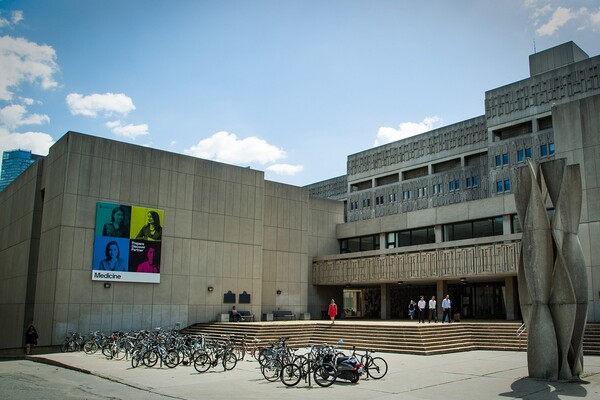The Foundations of a Medical Professional

Liam Mitchell

Even before the first day of class, medical students start learning about the foundational values of their chosen profession.
As part of orientation events, students participate in a Stethoscope Ceremony in August where each student is given a stethoscope as a symbol of his or her commitment to the profession they are joining. The stethoscope was chosen because, as Professor David McKnight noted, this symbolic medical instrument only functions “…if there is a person at each end — and it is all about listening.”
They also hear from members of the faculty on the importance of professional conduct as a physician. McKnight told students at the first stethoscope ceremony in 2010 that the cornerstone of the profession was built on trust and respect. “For patients, respect their concerns and goals. Respect their privacy and their confidences. Respect their individuality.”
That respect – and honouring the trust patients place in their physicians – is key.
“We want to ensure our graduates not only understand the ethical and legal obligations they have as physicians, but also model the very highest standards of the profession in their day-to-day interactions with patients and colleagues,” said Professor Trevor Young, Dean of the University of Toronto’s Faculty of Medicine.
In the first two years of the medical program – known as Preclerkship – students complete 52 hours of lessons on ethics and professionalism. As Professor Erika Abner explained, the focus is on providing students with an early grounding in their legal, ethical and professional obligations.
“We engage students not only through formal lectures, but also through case studies that allow our students to see how these issues are lived in a clinical setting,” said Abner, who is the Faculty Lead for Ethics and Professionalism. She noted that sessions are delivered by a broad range of experts including clinicians, residents (i.e. recent medical school graduates completing specialty training), lawyers, and bio-ethicists.
With the introduction of the new Foundations Curriculum, which will reinvent the preclerkship curriculum beginning in September 2016, these lessons will be further integrated into a broader range of courses and issues. This is designed to help students understand the ethical and professional implications in a broader range of situations.
Before students begin their training in the clerkship, which is the final two years of the MD program in which students work as members of the health care team providing care to patients, students undergo a three-week training program known as Transition to Clerkship. It includes a major focus on professional conduct as well as patient safety.
“It’s a boot camp, of sorts,” explained Clerkship Director Professor Stacey Bernstein. “We want to review, remind and instill key topics in our students before they are integrated into health care delivery.” These key topics include critical aspects of ethics and professionalism including medicolegal topics, professional duties of physicians, and managing the doctor-patient relationship.
As clerks, students participate in an additional 18 hours of training on professionalism, ethics and medical jurisprudence. Clerks get evaluated on professionalism at the end of every clinical rotation, in addition to the evaluation of their clinical performance. Students also participate in a longitudinal reflective course called Portfolio where they reflect on various roles – including professionalism – as they move through their clinical rotations. They meet in small groups with a resident and faculty facilitator, and also submit written reflective work. This portfolio course will soon be expanded to include the first two years of medical school as part of the Foundations Curriculum.
“This will allow students to form a community of practice as they enter clinical medicine as active members of the health care team, where they are mentored by a resident and senior faculty member. It is in the groups that students can explore in a safe setting the examples of professionalism they see every day, their struggles, and seek support,” said Professor Pier Bryden, Director of the Preclerkship Program.
Along the way, students are evaluated on their professionalism by faculty members. Evaluations can also be provided by other staff and professionals who work or interact with students. The Faculty of Medicine has a detailed process for review, should students start to exhibit a pattern of unprofessional or disruptive behavior. This includes tardiness and not facilitating teamwork, but can include more serious problematic behaviors
“We recognize that students are still learning and we want to support them. If there are underlying issues, we want to help identify the support services students may need to overcome challenges they are facing,” said Abner. “At the same time, if there is a pattern that suggests students may not be prepared or they’re acting inappropriately, we need to identify that early to take the appropriate steps. We want to ensure the wellness and safety of everyone involved, including both students and patients.”
After graduating from the MD program, students proceed into residency and fellowship training – a period known as Postgraduate Medical Education. At U of T, there are 80 different specialties and subspecialties. Governing their training is the CanMEDS Framework, which was established by the Royal College of Physicians and Surgeons of Canada and the College of Family Physicians of Canada. The Royal College and College of Family Physicians are responsible for accrediting postgraduate training programs and ensuring that all specialists meet the requirements for certification in their field.
Within the CanMEDS framework, learners must demonstrate competency in core areas, including professionalism. This framework is tailored to each specific program to ensure it is relevant and applicable. In addition, residents and fellows are overseen by supervising physicians, who regularly provide feedback on professionalism in both informal and formal ways.
“With the shift towards CanMEDS, there is a bigger emphasis on more direct observation and feedback,” said Professor Salvatore Spadafora, Vice Dean of Post-MD Education. “I know in my own experience as an anesthesiologist, I make a point of providing feedback face-to-face with trainees before, during and following surgery to tell them what went well and what didn’t.”
During their training program, residents and fellows often meet weekly as a group to review their experiences and review topics like ethics and professionalism, as well as self-reflection to recognize where personal challenges may lay.
“The vast majority of people training with us are really great people. Are they all perfect? No. But none of us are,” explained Spadafora. “There is an ongoing conversation to equip our residents and fellows with a skill set that helps them address challenges in professional and productive ways.” This includes workshops on stress management, managing risks associated with fatigue, and identifying particular triggers that may lead to unprofessional conduct.
In the event of a critical incident, the matter is quickly referred to the site supervisor and program director for review. If further attention is required, the responsibility may be shared with the hospital or health care institution where the resident or fellow is based. During their postgraduate training, these physicians are not only U of T students, but also employees of the hospital system and receive certificates of registration with the College of Physicians and Surgeons of Ontario. Therefore, they are expected to conduct themselves according to the policies and procedures of all three groups.
“To be the best physician possible, you need to be capable, ethical and professional,” said U of T Medicine Dean Young. “We want to ensure our students leave ready to fulfill their obligations and be leaders in their field. Through the comprehensive training we provided, we’re confident that goal is being achieved. But that will not stop us from continuing to find new ways to improve the training we provide to ensure even better doctors for Ontario, Canada and the world.”
News


